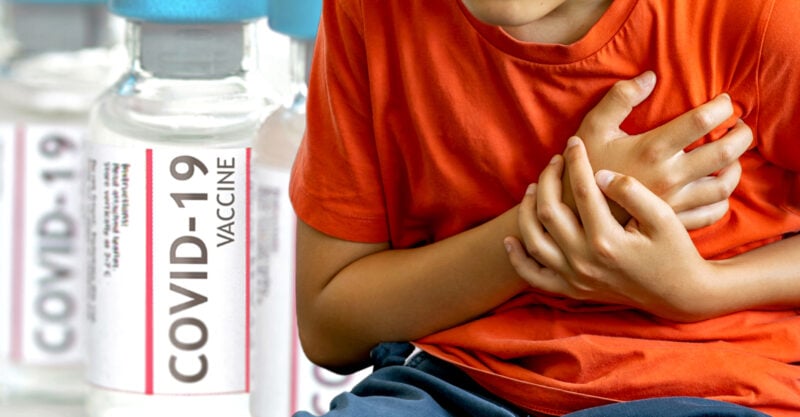It is now official as reported by peer-reviewed studies: The Pfizer vaccine does increase the risk of Myocarditis.
In other words, all these videos of healthy people falling dead from massive heath attacks in their 20s and 30s were not a statistical illusion.
The vaccines ARE dangerous. Certainly far more than the mild virus that Covid-19 has turned into over the last two years. But faced with bureaucratic inertia, how long will it take for vaccination mandates to be cancelled?

A prospective study in Thailand conducted during the country’s national COVID-19 vaccination campaign for adolescents showed what one physician described as a “stunning” association between myocarditis and the Pfizer-BioNTech vaccine.
The preprint, accepted for publication in a peer-reviewed journal, involved 314 participants ages 13-18 who were healthy and without abnormal symptoms after receiving their first vaccine dose.
Participants with a history of cardiomyopathy, tuberculous pericarditis or constrictive pericarditis and severe allergic reaction to the COVID-19 vaccine were excluded from the study.
Although the study included 314 adolescents, 13 were excluded from the findings as they were “lost to follow-up.”
Of the 301 remaining participants, 202 (67.1%) were male.
Researchers found that 18% of the 301 teens analyzed had an abnormal electrocardiogram, or EKG after receiving their second dose of Pfizer, 3.5% of males developed myopericarditis or subclinical myocarditis, two were hospitalized and one was admitted to the ICU for heart problems.
Cardiovascular adverse events observed during the study included tachycardia (7.64%), shortness of breath (6.64%), palpitation (4.32%), chest pain (4.32%) and hypertension (3.99%).
Fifty-four adolescents had abnormal electrocardiograms after vaccination, three patients had minimal pericardial effusion with findings compatible with subacute myopericarditis and six patients experienced mitral valve prolapse.
Myocarditis is inflammation of the heart muscle that can lead to cardiac arrhythmia and death. According to the National Organization for Rare Disorders, myocarditis can result from infections, but “more commonly the myocarditis is a result of the body’s immune reaction to the initial heart damage.”
Pericarditis is inflammation of the tissue surrounding the heart that can cause sharp chest pain and other symptoms.
According to the study, the most common symptom was chest pain, followed by chest discomfort, fever and headache.
Three patients between the ages of 13 and 18 reported chest pain and biomarkers were evaluated. All three reported the symptoms within 24-48 hours of receiving the second dose of Pfizer.
Four patients had no symptoms but had elevated biomarkers.
All patients were male and had abnormal electrocardiograms, particularly sinus tachycardia. The clinical course was mild in all cases.
The majority of the participants (257/301 or 85.38%) had no underlying diseases prior to being vaccinated.
As part of the study, participants received a diary card to record cardiac symptoms. Those who developed side effects from the vaccine could call the principal investigator and be transferred to a medical team at the Hospital for Tropical Diseases for assessment.
If the participant developed abnormal EKG, echocardiographic findings or increased cardiac enzymes, the principal investigator scheduled patients for follow-up per the study’s protocol and for day 14 lab assessments.
Individuals were monitored with laboratory tests including cardiac biomarkers, ECG and echocardiography at three clinical visits — baseline, day 3, day 7 and day 14 after receiving the second dose of the Pfizer BioNTech COVID-19 vaccine.
The diagnostic criteria for myocarditis were classified as either
probable cases or confirmed cases and were based on clinical symptoms
and medical tests.
The researchers concluded the clinical presentation of myopericarditis
after vaccination was “usually mild,” with all cases fully recovering
within 14 days and recommended adolescents receiving mRNA vaccines be
monitored for side effects.
Dr. Tracy Høeg, an epidemiologist, in a tweet said the study is “unique & impressive because of the extensive workup both pre and post vaccination” as the study could “detect pre-existing cardiac abnormalities.”
Independent journalist Jordan Schachtel noted in a tweet the cardiac events witnessed during the study occurred after only one shot of Pfizer, as children with heart conditions had been excluded.


No comments:
Post a Comment